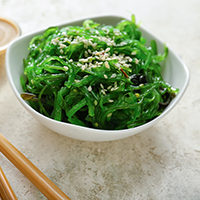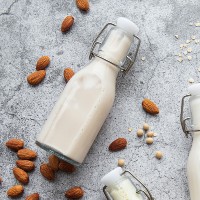
Why is iodine important?
Iodine is an essential mineral used by your body to make thyroid hormones. These hormones control how fast your cells work. They are also needed for growth and brain development during pregnancy and childhood.

How much Iodine do you need?
In the UK, the general iodine intake recommended for adults is 140 mcg (micrograms) per day.1 Requirements for pregnancy, breastfeeding and childhood are outlined in our information about different life stages available at www.vegansociety.com/nutrition.
There are concerns that some groups of people in the UK are not meeting the recommendations for iodine intake, including teenage girls, those who are pregnant and breastfeeding, and people who do not eat dairy and fish.2 However, it is also important to avoid too much iodine because this can lead to thyroid disorders.
The iodine content of a particular plant food varies depending on how much iodine was present in its growing environment. There is no easy way of knowing how much iodine is in plant foods, but they may contain low amounts. It is therefore recommended that vegans top up their iodine intake to avoid iodine deficiency.
Iodised salt is not a great option because public health authorities recommend that we should cut down on salt. Diets high in salt remain a public health concern, as excess salt has been linked to high blood pressure, which can increase the risk of heart disease and stroke.
Seaweed is an unusually rich source of iodine for vegans. For example, one and a half to two sheets (4 g) of nori can provide the recommended daily intake.3 However, regular seaweed consumption is not recommended because it provides variable amounts of iodine and some types of seaweed, such as kelp, contain too much. Both spikes and long-term increases in iodine intake have been linked to thyroid problems.4
Arguably, taking a daily supplement containing iodine is the most reliable way of getting enough iodine in your daily diet. Check that the source is not seaweed; the ingredients list should state potassium iodide or potassium iodate. Experts recommend that the amount of iodine in supplements should not exceed 150 mcg.5 The Vegan Society markets a daily vitamin and mineral supplement designed for vegans called VEG 1, which includes iodine, as well as selenium and vitamins B12 and D.
Another option is to use a milk alternative fortified with iodine if your daily consumption is consistently around 500 mL (half a carton). You can identify this type of product by looking for iodine in the nutrition information on the label – around 25 mcg per 100 mL is a good level. You may also see potassium iodide in the list of ingredients.
Iodine tips to take away
The following options are reliable ways of adding iodine to a vegan diet:
- Ensure a daily intake of around 500 mL of a fortified milk alternative that includes iodine.
- Use a daily supplement containing potassium iodide or potassium iodate.
Further information
You might be interested to check out the following webpages:
- Vegan diets and iodine: a vegan dietitian’s perspective.
- Nutrition overview – information to help you ensure that your overall diet is balanced and varied.
- Life stages – including pregnancy, breastfeeding and different age groups.
Refrences
- Committee on Medical Aspects of Food and Nutrition. Dietary Reference Values for Food Energy and Nutrients for the United Kingdom London: HMSO; 1991
- Scientific Advisory Committee on Nutrition. SACN Statement on Iodine and Health; 2014 www.gov.uk/government/uploads/system/uploads/attachment_data/file/339439/SACN_Iodine_and_Health_2014.pdf (accessed 12 October 2023)
- Teas J, Pino S, Critchley A & Braverman LE. Variability of Iodine Content in Common Commercially Available Edible Seaweeds. Thyroid 2004; 14 (10): 836–841
- Leung AM & Braverman LE. Iodine-induced Thyroid Dysfunction. Current Opinion in Endocrinology, Diabetes and Obesity 2012; 19: 414–419
- British Dietetic Association. Iodine: Food Fact Sheet; 2019 www.bda.uk.com/resource/iodine.html (accessed 12 October 2023)
These are general guidelines about nutrition. If you have concerns about your diet, please talk to your doctor about seeing a dietitian. Discussing the use of supplements with a health professional will help to ensure that they are suitable for you.
